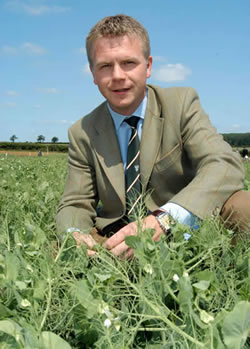
Quality and quantity paid off for agronomists competing in the PGRO Pea Crop Challenge this year, with the wining team of pea specialists from Syngenta growing the most profitable crop - with a margin of £430/ha.
A yield of 4.32 t/ha from their plot of premium Marrowfat variety, Princess, was nearly 20% lower than the team's other plot of the Large Blue variety, Venture. But achieving a contract price of £160/t for the Marrowfats, compared to £96 for the Large Blues, more than offset the higher seed and growing costs, to deliver a margin worth £125/ha more.
The Pea Crop Challenge pits the agronomic expertise of leading commercial and independent agronomists in an annual competition to grow the most profitable crop of peas in two categories - Marrowfats and others. The crops, grown on the PGRO trials ground at Thornhough near Peterborough, are all managed by PGRO staff to the 11 competing teams' instructions.
Yorkshire-based Syngenta Vegetable specialist, Will Holmes, attributes their success to restricting costs of weed control compared to some other teams of agronomists in the challenge, whilst spending more on the fungicide programme that delivered the yield and quality.
"For the Princess we opted for post-emergence herbicide treatment once we knew the key weeds to be tackled, using Skirmish at 0.75l/ha plus a lower rate Basagram at 0.3l/ha to strengthen cleaver control. Using a relatively high seed rate, at 310 kg/ha, helped to suppress weed effects and give the crop a good stand."
The strong plant count from the Wakil treated seed also enabled the team to take the decision to miss out a spray for thrips, when most teams used the pea growers' standard Hallmark Zeon application. "We did benefit from other teams controlling pest pressure in the field, and reports of relatively low thrip numbers; in a commercial situation we would most likely have sprayed any crop destined for the premium human consumption market," adds Mr Holmes.
The drive for quality also extended to the fungicide programme, adopting one of the more comprehensive strategies among the competing teams. The early flowering application included Amistar, to counter Ascochyta leaf and pod spot disease, combined with Bravo to boost Botrytis and Mychosphaerella disease control. The tank mix also included Aphox to tackle rising pea aphid numbers, along with Hallmark Zeon to avoid Pea Moth damage that could seriously compromise premium pea values.
"The Amistar plus Bravo programme was the standard treatment on all four of the most profitable pea agronomy strategies in the challenge. The team which adopted a no fungicide strategy produced by far the lowest yielding and least profitable crops – averaging a loss of more than £10/ha over input costs on their two plots."
The clean sample of Princess from the Syngenta plot achieved the full £160/t contract price for premium Marrowfat peas, whilst other crops of Princess which received a less comprehensive fungicide programme suffered deductions of up to £51/tonne. "High yields are patently important," advises Mr Holmes, "but clearly achieving high quality is also an important element of commanding the premium prices to deliver the most profitable crops."
As overall winners of the Pea Crop Challenge and the Marrowfat category, the Syngenta team won a cheque for £1500, which is to be donated to the Royal National Institute for the Blind and Cancer Research.
